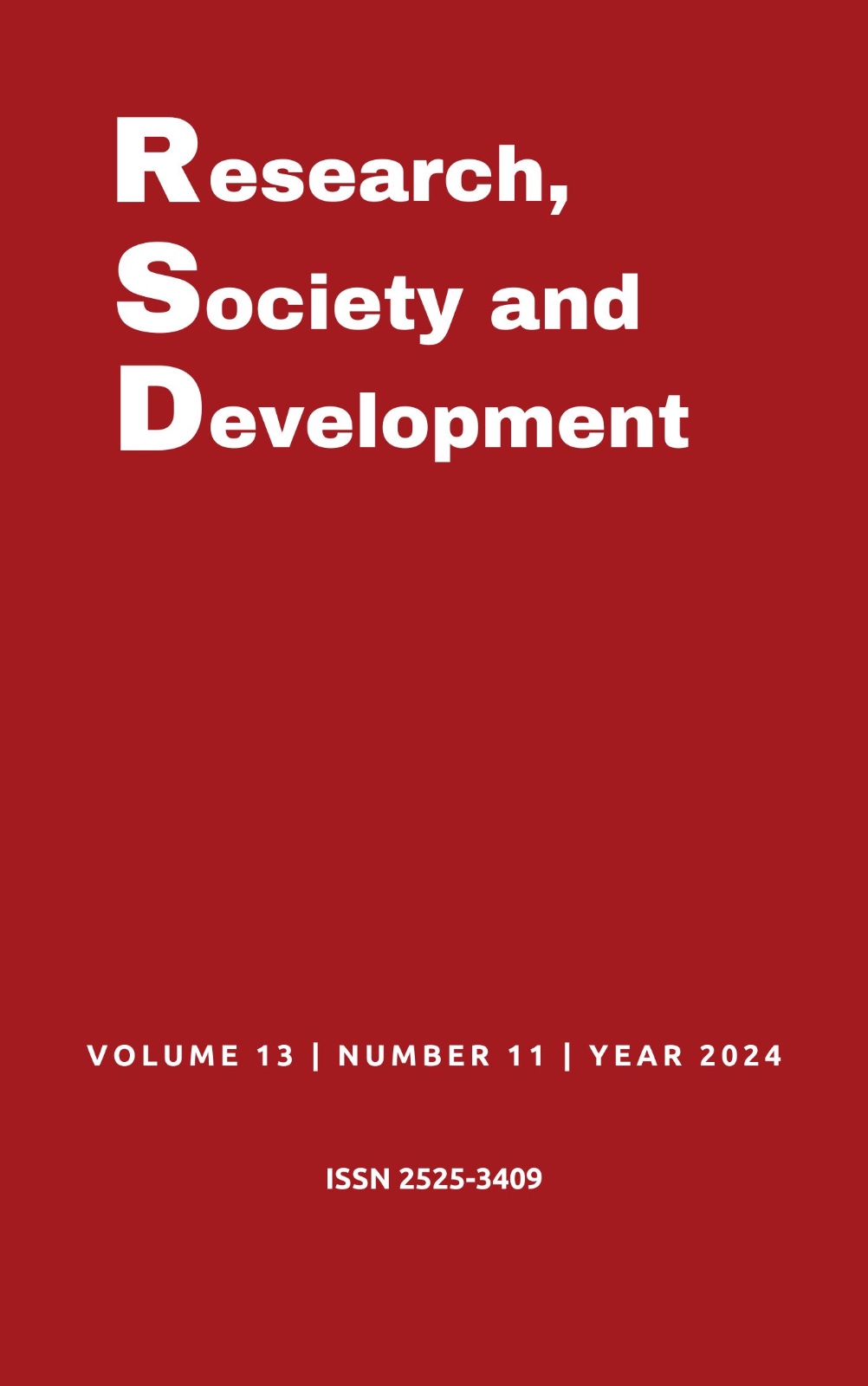Contribution of the multidisciplinary team of the better at home program in reversing a case considered palliative in the Municipality of Acreúna, Goias (GO) State, Brazil
DOI:
https://doi.org/10.33448/rsd-v13i11.47366Keywords:
Multidisciplinary Team; Reversal; Palliative Care.Abstract
This article aims to explore the contribution of the multidisciplinary team from the Melhor em Casa Program in reversing a case considered palliative in Acreúna, GO. It describes a retrospective case study of a patient admitted to the Melhor em Casa Program, in Acreúna - GO, on 08/08/2024, with Traumatic Brain Injury (TBI) and subdural hematoma. The patient also had comorbidities such as epilepsy, systemic arterial hypertension (SAH) and diabetes mellitus (DM). Due to the severity of his clinical condition, he was considered palliative and received nutritional support through Gastrostomy (GTT) and diseases with oxygenation and tracheostomy (TQT). The analysis was based on a review of the medical records, highlighting the work of the multidisciplinary team, made up of a doctor, nursing team, physiotherapy and nutritionist, who intervened to improve the patient's general condition. Throughout the treatment, a positive evolution was noted, with a direct impact on the patient's quality of life. The result of these interventions was significant, leading to the removal of the tracheostomy (TQT) and the reintroduction of oral feeding, demonstrating the success of specialized integrated care in the treatment of patients with multiple serious and delicate clinical conditions.
References
Alves, A. A., et al. (2023). Manejo dos cuidados paliativos: uma proposta de instrumento de educação permanente para a equipe multidisciplinar de um hospital público. Educação, 31(1), 1-21. Universidade Federal de Santa Maria. http://dx.doi.org/10.5902/1984644467529
Amici, M. R., & Sampaio, H. A. C. (2023). Reflexões sobre o letramento em saúde para terapia nutricional enteral domiciliar. Gestão & Cuidado em Saúde, 1(1), 1-12. https://doi.org/10.70368/gecs.v1i1.11210
Andrade, P. C. da S. T. de, et al. (2024). Identificação de pacientes elegíveis para cuidados paliativos em enfermaria clínica. Cuadernos de Educación y Desarrollo, 16(3), 3729-3739. https://doi.org/10.55905/cuadv16n3-101
Bolognese, M. A., et al. (2022). Terapia nutricional domiciliar: uma revisão. Research, Society and Development, 11(3), 1-12. https://doi.org/10.33448/rsd-v11i3.26130
Castro, E. A. B. de, Ferreira, L. F., & Silva, J. A. (2018). Organização da atenção domiciliar com o Programa Melhor em Casa. Revista Gaúcha de Enfermagem, 39, 1-12. https://doi.org/10.1590/1983-1447.2018.2016-0002
Côrte, M. M. D., et al. (2023). Validação de conteúdo de protocolo de decanulação de pacientes adultos traqueostomizados. Codas, 35(4), 1-12. FapUNIFESP (SciELO). https://doi.org/10.1590/2317-1782/20232021266pt.
Gonçalves, R. C., et al. (2021). Planejamento nutricional da alta hospitalar: breve revisão da literatura e proposta de instrumento de avaliação. Braspen Journal, 35(4), 329-339. https://doi.org/10.37111/braspenj.ae202035402
Lima Júnior, A. J. de, Pessoa, I. D. S., Rodrigues, E. F., & Almeida, A. P. (2023). Ocorrência e evitabilidade de eventos adversos em hospitais: estudo retrospectivo. Revista Brasileira de Enfermagem, 76(3), 1-12. FapUNIFESP (SciELO). http://dx.doi.org/10.1590/0034-7167-2022-0025pt.
Medeiros, G. C., et al. (2019). Critérios para decanulação da traqueostomia: revisão de literatura. Codas, 31(6), 1-12. FapUNIFESP (SciELO). https://doi.org/10.1590/2317-1782/20192018228.
Ministério da Saúde. (2017). Protocolo Clínico e Diretrizes Terapêuticas: Traumatismo Crânio-Encefálico. Brasília.
https://www.gov.br/saude/pt-br/assuntos/saude-da-pessoa/saude-do-adolescente/protocolos.
Nascimento, T. S., et al. (2022). Indicações de traqueostomia em uma unidade de terapia intensiva. Arquivos de Ciências da Saúde, 30(1), 1-12. Faculdade de Medicina de São José do Rio Preto - FAMERP. https://doi.org/10.17696/2318-3691.30.1.2023.176.
Oliveira, R. S. de et al. (2023). Cuidados paliativos em paciente portador de esclerose lateral amiotrófica: relato de caso na assistência domiciliar. Revista Neurociências, 31, 1-21. Universidade Federal de São Paulo. http://dx.doi.org/10.34024/rnc.2023.v31.14939.
Pereira A. S. et al. (2018). Metodologia da pesquisa científica. [free e-book]. Santa Maria/RS. Ed. UAB/NTE/UFSM.
Pinho, M. I. de. (2022). A repercussão do cuidado domiciliar em saúde para as famílias usuárias do programa Melhor em Casa: uma análise do município de Palhoça (TCC, Graduação). Universidade Federal de Santa Catarina.
Santos, M. S. A. et al. (2023). Protocolo para decanulação de traqueostomia pediátrica: evidências de validação de conteúdo. Audiology - Communication Research, 28, 2-24. FapUNIFESP (SciELO). http://dx.doi.org/10.1590/2317-6431-2022-2755pt
Schmitz, É. P. C. R. et al. (2022). Blenderized tube feeding for children: An integrative review. Revista Paulista de Pediatria, 1(1), 1-12. FapUNIFESP (SciELO). https://doi.org/10.1590/1984-0462/2022/40/2020419
Soares, T. H. V., et al. (2023). Traqueostomia: indicações, técnicas, cuidados, complicações e decanulação. Revista Eletrônica Acervo Médico, 23(4), 1-12. Revista Eletronica Acervo Saude. https://doi.org/10.25248/reamed.e12502.2023
Souza, M. C. dos S., Costa, A. C. da, & Almeida, M. M. (2021). Conforto de pacientes em cuidados paliativos: revisão integrativa. Enfermería Global, 20(1), 420-465. http://dx.doi.org/10.6018/eglobal.420751
Trentin, L. S. (2024). Os processos de tomada de decisão clínica em cuidados paliativos na perspectiva médica (Dissertação de Mestrado). Universidade Federal de Santa Maria.
Valim, O. Q. C. M., et al. (2024). Manejo integrado de politraumas faciais: uma revisão de abordagens e desafios. Revista Cpaqv - Centro de Pesquisas Avançadas em Qualidade de Vida, 16(2), 1-12. Revista CPAQV. http://dx.doi.org/10.36692/qwsm6j25
Vieira, D., et al. (2022). Proposta de formulação artesanal de dieta enteral com 1800 kcal, de baixo custo, baseada em alimentos usuais da população brasileira. Braspen Journal, 37(1), 60-65. https://doi.org/10.37111/braspenj.2022.37.1.09
Downloads
Published
How to Cite
Issue
Section
License
Copyright (c) 2024 Jerônimo Gregório da Silva Neto; Andriele Barbosa dos Santos ; Brunna Nascimento Ribeiro ; Bianca Rodrigues de Jesus; Samara Sousa Alberto; Mayara Aparecida dos Reis Lima ; Victor Hugo Silva Nascimento

This work is licensed under a Creative Commons Attribution 4.0 International License.
Authors who publish with this journal agree to the following terms:
1) Authors retain copyright and grant the journal right of first publication with the work simultaneously licensed under a Creative Commons Attribution License that allows others to share the work with an acknowledgement of the work's authorship and initial publication in this journal.
2) Authors are able to enter into separate, additional contractual arrangements for the non-exclusive distribution of the journal's published version of the work (e.g., post it to an institutional repository or publish it in a book), with an acknowledgement of its initial publication in this journal.
3) Authors are permitted and encouraged to post their work online (e.g., in institutional repositories or on their website) prior to and during the submission process, as it can lead to productive exchanges, as well as earlier and greater citation of published work.

